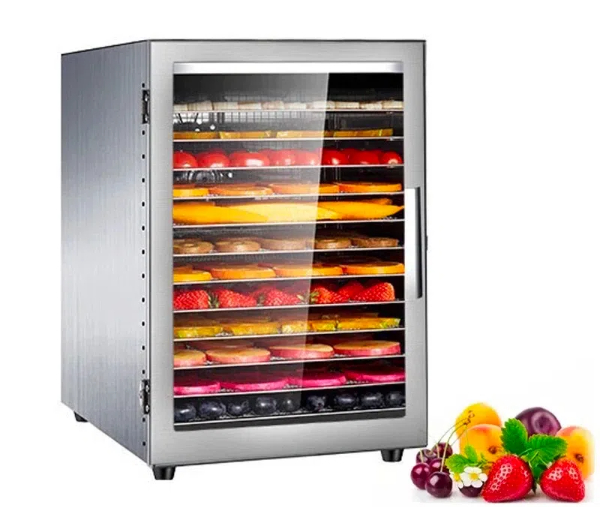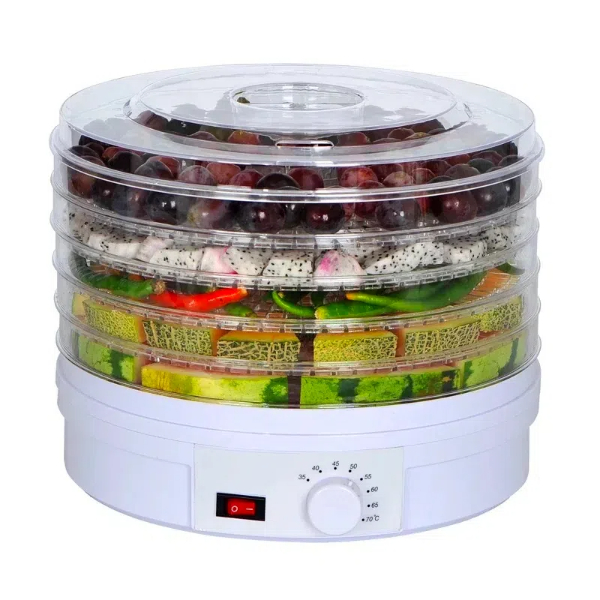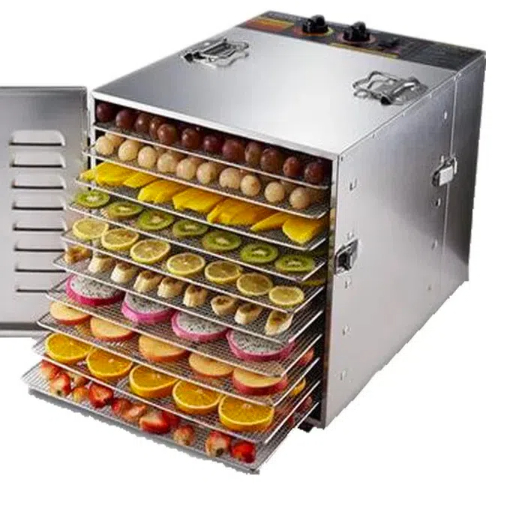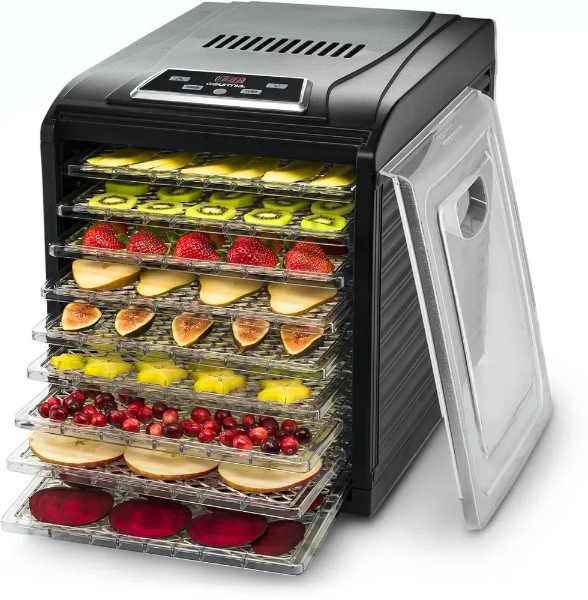
Content Menu
● Introduction: Revolutionizing Home Food Preservation
● Understanding the Home Food Drying Machine
>> How Does a Home Food Drying Machine Work?
>> Types of Home Food Drying Machines
● Benefits of Using a Home Food Drying Machine
>> 1. Extended Food Shelf Life
>> 2. Preservation of Nutrients
>> 3. Space-Efficient Storage
>> 4. Healthy Snack Options
>> 5. Cost-Effective
>> 6. Customization and Control
● Choosing the Right Home Food Drying Machine
>> 1. Capacity
>> 2. Temperature Control
>> 3. Air Flow
>> 4. Noise Level
>> 5. Ease of Use and Cleaning
>> 6. Energy Efficiency
● Popular Foods to Dry in Your Home Food Drying Machine
>> 1. Fruits
>> 2. Vegetables
>> 3. Herbs
>> 4. Meats
>> 5. Flowers
● Tips for Successful Food Drying
● Creative Uses for Your Dried Foods
● Maintenance and Care of Your Home Food Drying Machine
● Conclusion: Embracing the Food Drying Revolution
● Frequently Asked Questions
>> Q1: How long does it take to dry food in a home food drying machine?
>> Q2: Is it safe to leave a food drying machine running overnight?
>> Q3: Can I dry different types of food together in my home food drying machine?
>> Q4: How do I know when my food is properly dried?
>> Q5: How long can I store food dried in a home food drying machine?
Introduction: Revolutionizing Home Food Preservation
In an era where health-conscious eating and sustainable living are at the forefront of our minds, the home food drying machine has emerged as a game-changer in kitchen appliances. This versatile device, also known as a food dehydrator, has transformed the way we preserve food, create healthy snacks, and reduce food waste. Whether you're an avid gardener with excess produce, a health enthusiast looking for nutritious snack options, or simply someone who wants to extend the shelf life of their favorite foods, a home food drying machine is an invaluable tool that deserves a place in your kitchen.
Understanding the Home Food Drying Machine
A home food drying machine, or food dehydrator, is an appliance designed to remove moisture from food items, effectively preserving them for long-term storage. By circulating warm air over food placed on trays, these machines slowly evaporate water content, concentrating flavors and nutrients while inhibiting the growth of bacteria and mold.

How Does a Home Food Drying Machine Work?
The process of food dehydration is relatively simple yet highly effective:
1. Preparation: Food is washed, sliced, and arranged on trays.
2. Loading: Trays are placed into the food drying machine.
3. Dehydration: Warm air circulates through the machine, gradually removing moisture.
4. Monitoring: The process is monitored to ensure optimal drying without over-drying.
5. Cooling and Storage: Once dried, food is cooled and stored in airtight containers.
Types of Home Food Drying Machines
There are several types of home food drying machines available, catering to different needs and preferences:
1. Stackable Tray Dehydrators: These are the most common and affordable options, featuring a vertical stack of trays with a fan at the base or top.
2. Shelf Dehydrators: These offer more space and often provide more even drying, with trays that slide in like oven racks.
3. Home Freeze Dryers: While more expensive, these machines use a freezing process to remove moisture, preserving more nutrients and flavor.
Benefits of Using a Home Food Drying Machine
Investing in a home food drying machine offers numerous advantages:
1. Extended Food Shelf Life
By removing moisture, food drying machines significantly extend the shelf life of fruits, vegetables, herbs, and meats. Properly dried and stored foods can last for months or even years, reducing waste and saving money.
2. Preservation of Nutrients
Unlike some preservation methods that can degrade nutritional value, food drying retains most of the original nutrients in foods. This makes dried foods an excellent source of vitamins, minerals, and fiber.
3. Space-Efficient Storage
Dried foods take up significantly less space than their fresh counterparts, making them ideal for those with limited storage. This is particularly beneficial for preserving large harvests or bulk purchases.
4. Healthy Snack Options
A home food drying machine allows you to create a variety of healthy, preservative-free snacks. From fruit leathers to vegetable chips and jerky, the possibilities are endless and far healthier than many store-bought alternatives.
5. Cost-Effective
While there is an initial investment in purchasing a food drying machine, it can lead to significant savings over time. By buying produce in season and in bulk, then drying it for later use, you can reduce your overall food expenses.
6. Customization and Control
With a home food drying machine, you have complete control over the ingredients and preparation methods. This is particularly beneficial for those with dietary restrictions or preferences.

Choosing the Right Home Food Drying Machine
Selecting the perfect home food drying machine depends on several factors:
1. Capacity
Consider how much food you plan to dry at once. Larger families or those with gardens may benefit from machines with more trays or larger drying areas.
2. Temperature Control
Look for machines with adjustable temperature settings. Different foods require different drying temperatures for optimal results.
3. Air Flow
Efficient air circulation is crucial for even drying. Some models offer horizontal air flow, which can provide more consistent results.
4. Noise Level
Since drying can take several hours, consider the noise level of the machine, especially if you plan to run it overnight or in shared living spaces.
5. Ease of Use and Cleaning
Look for machines with dishwasher-safe trays and easy-to-clean designs to simplify maintenance.
6. Energy Efficiency
Consider the power consumption of the machine, especially if you plan to use it frequently. Some models are more energy-efficient than others.
Popular Foods to Dry in Your Home Food Drying Machine
The versatility of a home food drying machine allows you to preserve a wide variety of foods:
1. Fruits
Apples, bananas, berries, mangoes, and pineapples are excellent choices for drying. They make great snacks and can be used in baking or trail mixes.
2. Vegetables
Carrots, bell peppers, onions, and tomatoes dry well and can be rehydrated for use in soups, stews, and casseroles.
3. Herbs
Preserve the flavors of your herb garden by drying basil, oregano, thyme, and rosemary. Dried herbs retain their potency and are perfect for seasoning dishes year-round.
4. Meats
Create your own jerky from beef, turkey, or even fish. Homemade jerky allows you to control the ingredients and flavors.
5. Flowers
While not for eating, dried flowers can be used for crafts, potpourri, or natural decorations.
Tips for Successful Food Drying
To get the most out of your home food drying machine, follow these tips:
1. Prepare foods uniformly: Cut fruits and vegetables into even slices for consistent drying.
2. Pre-treat fruits: Dip fruits prone to browning in lemon juice or ascorbic acid solution before drying.
3. Rotate trays: If your machine doesn't have horizontal air flow, rotate trays during the drying process for even results.
4. Check for dryness: Foods should be leathery or crisp when properly dried. Allow a few pieces to cool before testing.
5. Store properly: Once dried, store foods in airtight containers in a cool, dark place.
6. Label and date: Always label your dried foods with the contents and date of drying.
Creative Uses for Your Dried Foods
Once you've mastered the art of using your home food drying machine, explore these creative ways to use your dried foods:
1. Homemade trail mix: Combine dried fruits, nuts, and seeds for a nutritious snack.
2. Flavored salts and sugars: Blend dried herbs or fruits with salt or sugar for unique seasonings.
3. DIY tea blends: Mix dried fruits and herbs to create custom tea blends.
4. Potpourri: Use dried flowers and spices to create fragrant potpourri.
5. Decorative wreaths: Craft beautiful wreaths using dried fruits, flowers, and herbs.
Maintenance and Care of Your Home Food Drying Machine
To ensure your home food drying machine continues to perform optimally:
1. Clean trays and the interior after each use.
2. Check and clean filters regularly if your machine has them.
3. Store the machine in a clean, dry place when not in use.
4. Inspect the fan and heating element periodically for any signs of wear.
5. Follow the manufacturer's instructions for any specific maintenance requirements.
Conclusion: Embracing the Food Drying Revolution
A home food drying machine is more than just an appliance; it's a gateway to a more sustainable, healthy, and creative approach to food. By preserving nature's bounty, you're not only extending the life of your food but also opening up a world of culinary possibilities. From creating nutritious snacks to reducing food waste and saving money, the benefits of owning a food dehydrator are numerous and far-reaching.
As we become more conscious of our food choices and their impact on our health and the environment, tools like the home food drying machine become invaluable allies in our kitchens. They empower us to take control of our food preservation, reduce our reliance on processed foods, and explore new flavors and textures.
Whether you're a seasoned chef, a health enthusiast, or simply someone looking to make the most of their garden harvest, a home food drying machine is a worthwhile investment. It's a step towards a more sustainable lifestyle, a tool for culinary creativity, and a means to enjoy the fruits of your labor long after the growing season has passed.
So why not take the plunge and discover the world of food drying? Your taste buds, your wallet, and the planet will thank you.

Frequently Asked Questions
Q1: How long does it take to dry food in a home food drying machine?
A1: The drying time can vary depending on the type of food, its moisture content, and the efficiency of your machine. Generally, fruits can take 6-16 hours, vegetables 4-10 hours, and meats 4-12 hours. Always refer to your machine's manual and check food regularly during the drying process.
Q2: Is it safe to leave a food drying machine running overnight?
A2: Most modern home food drying machines are designed to be left running for extended periods, including overnight. However, it's essential to follow the manufacturer's instructions and ensure proper ventilation. Some users prefer to start the process in the morning so they can check on it throughout the day.
Q3: Can I dry different types of food together in my home food drying machine?
A3: While it's possible to dry different foods simultaneously, it's generally not recommended. Different foods often require different drying times and temperatures. Additionally, flavors can transfer between foods during the drying process. For best results, dry similar foods together.
Q4: How do I know when my food is properly dried?
A4: Properly dried foods should be leathery or crisp, depending on the type. Fruits should be pliable but not sticky, vegetables should be brittle, and jerky should bend without breaking. Always allow a few pieces to cool before testing for dryness, as warm food may feel moister than it actually is.
Q5: How long can I store food dried in a home food drying machine?
A5: When properly dried and stored in airtight containers in a cool, dark place, most dried foods can last 6-12 months. Some items, like dried herbs, can last even longer. However, it's always best to check your dried foods periodically and use them within a reasonable timeframe for the best quality and flavor.












